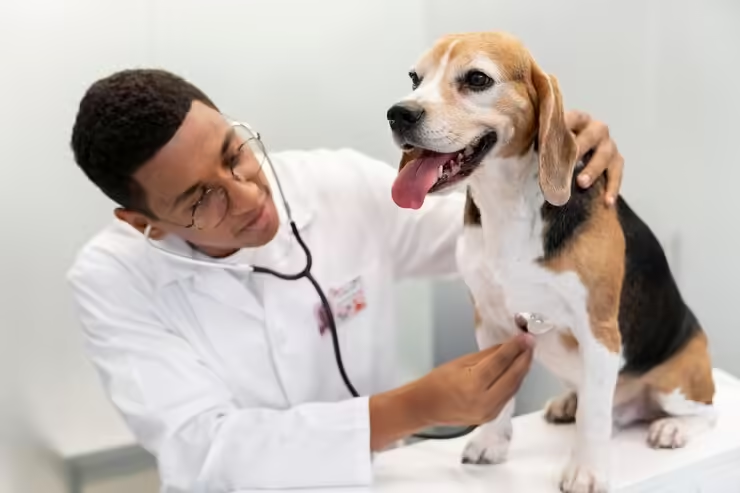Pets can’t always communicate when they’re feeling unwell, so it’s up to us to watch for signs that something may be wrong. Just like us, our pets can experience discomfort, illness, and pain, and they rely on their owners to recognize the signs. Sometimes, these indicators are subtle, while other times, they’re more obvious. Learning to recognize these warning signals can mean the difference between early treatment and a serious health emergency. Here are seven crucial signs that your pet may need a vet visit as soon as possible.
1. Changes in Eating or Drinking Habits
Your pet’s eating and drinking habits are often a clear indicator of their overall health. When there’s a sudden change in appetite, it’s important to pay attention.
Reduced Appetite
If your pet suddenly stops eating or shows a decrease in appetite for more than 24 hours, it could signal various health issues, from minor digestive upset to something more serious like kidney or liver problems. Loss of appetite should never be ignored, especially if your pet is usually a good eater.
Increased Thirst
Drinking more water than usual can also be a sign of underlying health issues, such as diabetes or kidney disease. Cats, for example, are generally low water drinkers, so an increase in water intake could be particularly concerning. Increased thirst paired with increased urination could be a red flag.
2. Unexplained Weight Loss or Weight Gain
Fluctuations in weight are a common signal that something’s off with your pet’s health.
Sudden Weight Loss
Losing weight quickly without any changes to diet or exercise is often a sign of serious health issues, including cancer, thyroid disease, or diabetes. Even a subtle decrease in weight over a few weeks can be a reason to schedule a vet visit.
Rapid Weight Gain
On the flip side, sudden weight gain or bloating could indicate conditions like hypothyroidism, fluid retention, or other metabolic problems. If you notice your pet looking rounder or swollen, especially around the abdomen, it’s wise to consult with your vet.
3. Persistent Vomiting or Diarrhea
Occasional vomiting or loose stools may not be a cause for concern, but when these symptoms persist, it could be a sign of digestive issues or other health problems.
Frequent Vomiting
If your pet vomits frequently (more than once or twice within a day) or if the vomiting persists over a few days, it’s time to see the vet. Persistent vomiting could indicate an obstruction, gastrointestinal disease, or even poisoning.
Chronic Diarrhea
Diarrhea lasting more than 24 hours, especially if it’s accompanied by lethargy or a lack of appetite, warrants a visit to the vet. Chronic diarrhea can lead to dehydration and may indicate infections, allergies, or even parasites.
4. Changes in Behavior or Mood
Behavioral changes can be one of the most telling signs of a health issue, as animals often hide pain or illness.
Increased Aggression or Irritability
If a usually calm pet becomes aggressive or irritable, it may be experiencing discomfort or pain. This could be due to dental issues, arthritis, or internal health problems.
Lethargy or Depression
If your pet suddenly becomes unusually tired, less interactive, or appears sad, it could indicate conditions ranging from infections to hormonal imbalances. Lethargy is often a major sign that something is not right and should be taken seriously.
5. Difficulty Breathing or Persistent Coughing
Breathing problems are always serious and warrant immediate attention, especially in pets, as they can escalate quickly.
Labored Breathing
If you notice that your pet is breathing heavily, wheezing, or struggling to catch its breath, it could be dealing with a respiratory infection, heart condition, or even an allergic reaction. Labored breathing is always an emergency and requires immediate vet care.
Constant Coughing
Chronic coughing, especially in dogs, may indicate problems such as kennel cough, bronchitis, or heart disease. Persistent coughing should not be ignored, as it can also be a symptom of fluid buildup in the lungs or respiratory infections.
6. Changes in Urination or Bowel Habits
A sudden change in bathroom habits can be an indicator of underlying health problems.
Increased Urination or Difficulty Urinating
If your pet is urinating more frequently, struggling to urinate, or showing signs of discomfort while trying to go, it could indicate bladder or kidney issues, urinary tract infections, or diabetes. Difficulty urinating, particularly in cats, is an emergency situation, as it may suggest a blockage that requires immediate attention.
Straining During Bowel Movements
Straining to defecate, passing hard stools, or seeing blood in the stool can all point to gastrointestinal issues. Constipation can become serious if not treated, and any blood in the stool should be checked by a vet.
7. Physical Changes or Lumps and Bumps
Examining your pet’s body regularly for any unusual lumps, bumps, or sores can help detect problems early.
Lumps and Bumps
While not every lump is dangerous, some can be malignant. If you find a new lump, or if an existing lump changes in size, color, or shape, it’s essential to have it evaluated by a vet. Some cancers can spread quickly, so prompt action can be life-saving.
Skin and Coat Changes
Changes in your pet’s skin or coat, such as hair loss, scaly patches, redness, or excessive scratching, may indicate skin infections, allergies, or even endocrine issues. Regular grooming and physical checks help you catch these issues early.
Final Thoughts: Don’t Ignore Warning Signs
Pets are experts at hiding pain and illness, which makes it even more crucial for pet owners to stay observant and proactive. Small signs can be early indicators of big issues, so knowing what to look for can truly make a difference in your pet’s health and quality of life. Regular vet check-ups are always a good idea, but if you spot any of these signs, it’s best to get them checked sooner rather than later. Your pet depends on you to keep them safe, healthy, and happy.



Hi, I do think this is an excellent site. I stumbledupon it 😉 I
will come back once again since I book marked it. Money and freedom is the best way to change, may
you be rich and continue to guide other people.